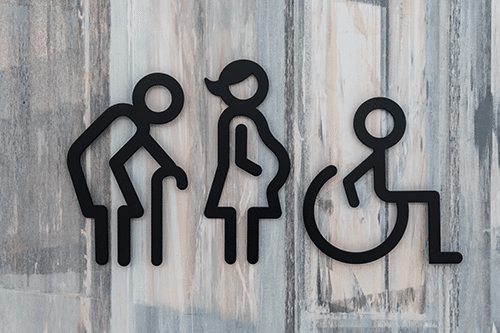What is Religion Discrimination?
Religious discrimination occurs when a workplace treats employees differently because of their religion or religious practice and their demand for accommodation. It also involves differing treatment for workers due to their lack of religious belief or practice. The legislation on both state and federal level against religious discrimination protect those belonging to conventional organized religions such as Christianity, Islam, Judaism, and other faiths and all persons who hold genuinely religious, moral, or ethical views. You may have experienced unlawful religious discrimination if you are denied work, dismissed, harassed, or otherwise injured because of your religion, religious belief, and practices, and your demand for accommodation of your religious beliefs and practices.
Title VII defines religion as all elements of religious observation, practice, and belief. Religion may not be a conventional organized religion like Buddhism, Christianity, or Hinduism. Religious convictions may involve uniqueness held by a few or even one individual; nevertheless, personal preferences are not religious convictions, and beliefs are not only protected because they are firmly held.
The EEOC has established that religion usually involves “last thoughts” about “life, meaning, and death.” Social, political, or economic ideologies and personal preferences are not protected by Title VII “religious” beliefs.
Certain employees who suffer from religious discrimination may also face other kinds of unlawful discrimination, such as discrimination of national origin, discrimination against immigration/citizenship, or race. Generally, there are three primary forms of religious discrimination at work: (1) Decisions regarding employment due to religious choice, (2) Discrimination motivated by religious choice, and (3) Inability to apply religious practices appropriately. Some instances of possibly illegal discrimination in religion are:
- Staffing: This kind of discrimination involves making or lacking choices on hiring based on someone’s beliefs. The employee may refuse to hire because he or she is a 7th day Adventist or Orthodox Jew, and they observe a Saturday Sabbath; firing an employee after they miss work to observe an episode for a religious holiday; or promoting an employee only when he or she is able to attend church every Sunday.
- Harassment: Harassment of people on the basis of religion can include saying they violate the company dress code because they wear religious wear such as yarmulkes, turban or hijabs; mocking a person on account of their strong Christian beliefs repeatedly; or mocking a Muslim employee for refusing pork in a picnic.
- Failure to accommodate: Religious accommodation denial is the most prevalent type of religious discrimination in the job. This kind of discrimination may include requiring an employee to work on their Sunday Sabbath, although other employees are willing to trade shifts with them; forcing an employee to remove the Hijab (scarf) to follow the dress code of a company even though others are wearing baseball hats; or not allowing employees to display religious icons or other religious beliefs.
Laws against Religious Harassment in the Workplace
Title VII of the 1964 Civil Rights Act (‘Title VII’) is a federal statute that protects people against discrimination on the grounds of religion. Title VII makes it unlawful for the employer to discriminate in hiring, firing, and other terms, and circumstances of employment, including promotions, increases, and other employment opportunities, against people on account of their religion.
Title VII also mandates that businesses adequately accommodate an employee’s or future employee’s religious beliefs unless it is an “unreasonable hurdle” to the employer. Flexible scheduling, voluntary alternatives or swaps, job relocation, business transfers, and the same range of salaries are examples of methods of meeting the religious views of an employee.
This implies that companies cannot treat workers more or less favorably because of their religion. Employees are not required to engage in a religious activity as a condition of employment or not participate in it. In addition, companies must also take measures to avoid discrimination against other workers on religion. Finally, employers cannot retaliate against workers for exercising their right to file discrimination lawsuits under Title VII, talk about wages with other employees, or act as witnesses in someone else’s discrimination case.
At the state level, the Oregon Fair Employment Practice Act (ORS Sec. 659A.030 et seq.) bans any public or private worker from employing an employee or prospective employees, irrespective of the number of employees, on a religious or religion basis.
The Equal Employment Opportunity Commission (EEOC) is the federal government agency responsible for the investigation of employment discrimination allegations relating to religious discrimination or lack of employment in employment for fifteen or more workers. At the state level, the Labor and Industries Bureau is responsible for implementing the State’s anti-discrimination legislation.
Title VII applies to all private businesses, government, municipal government, and schools employing 15 or more people. Title VII also includes private and government agencies for employment, labor organizations, and joint committees to administer apprenticeship and training.
However, the minimal number of workers necessary to file claims varies according to state legislation, making it unlawful to discriminate based on religion.
Protection against discrimination applies to employees and existing employees alike. If you are a current employee and, as a result of your religious belief in practice, are fired, not promoted, or paid at a reduced rate, you are protected by law. You are also covered if you are denied employment because of your religious beliefs.

It is essential to emphasize that the purpose of the legislation is to safeguard organized religions and a wide variety of religious practices and beliefs. This implies that it does not necessarily mean that you do not have genuine faith because you do not belong to an official, structured religion. While religious ideas are actual, performed, and obeyed, it is essential if they are rational or comprehensible to others.
In addition to employers’ responsibility to avoid and resolve religious conflicts, workers have a duty to disclose their employer’s dispute. To accomplish this, an employee should inform the employer at the time the job is accepted or soon after becoming aware of the need for accommodation of any religious beliefs or practices. As an employee, it is important to convey religious obligations in writing; it is not enough to merely communicate them orally. Explain why you require accomodation and what kind of accommodation you propose. Keep copies of all sending and receiving information from your employment and copies of the information provided by your church or religious authorities.
Some of these specific acts by your employers may be considered as religious discrimination:
- Failure to provide accommodation based on religious preferences: In a recent case before the Supreme Court, a lady was denied a position in a sales partnership because her Hijab was in violation of Abercrombie’s ‘look policy.’ In this case, The Court ruled that if managers even suspect a candidate or an employee’s religious opinions or need to stay, they may violate federal civil rights laws not to employ or accommodate the applicant or the employee, while at the same time implementing a totally neutral labor regulation. Even though a job applicant or employee does not inform the management of religious practice, the employer has to provide that applicant or employee with religious accommodation if they believe that the worker is following a particular religious belief or practice, even if this contradicts neutral company policies. However, remember that your employer is obliged to offer accommodation just as long as the employer does not become unfairly distressed or burdened.
This alters the notion that workers should first ask for accommodation and puts forth the new standard, which the employer must supply if he or she has even a distant suspicion of accommodation. If an employee is not hired or faced with unfavorable employment, they need simply demonstrate that their need for accommodation is a driving element in the employer’s choice.
In EEOC v. Baystate Med, however, Ctr., Inc. filed a complaint on 2 June 2016 claiming an employee at a hospital in Massachusetts was discriminated against because of religious reasons and expressed concerns about the option of wearing a face mask at work. She was suspended without pay at the medical facility after she was spotted without a mask at work. The EEOC claimed that the mask policy is unreasonable since others found it difficult to understand it when she spoke and suggested that it would not lead to any hardship or burden in the hospital by allowing her to remove the mask.
The lawsuit states that the rules of Baystate apply to all workers, even those not in touch with patients. The EEOC states that employees who failed to meet the policy on religious or other grounds had to wear a face mask or have been put on unpaid leave without employment protection until the policy or flu season has finished. This decision indicates that employers may doubt the sincerity of an employee’s claimed religion and probably solve the problem of what is seen as a ‘reasonable accommodation’ for religious belief and vaccine concerns.
- Failure to provide a religious holiday or preventing from taking one: An employer must offer you such an accommodation unless it imposes an unreasonable difficulty or unnecessary burden on the operations of the employer. This would be too expensive or difficult to offer accommodation. In view of these kinds of allegations, the Equal Employment Opportunity Commission (EEOC) has defined an unfair hardship as anything more than a normal administrative expense that would impair workplace effectiveness or damage safety in the workplace. It may be anything that disrupts the rights of other workers, causes them to take on the accommodated part of heavy labor, or conflicts with another rule or regulation. Employers are thus obliged to attempt to settle the religious dispute in good faith or to identify real money or administrative expenditure.
If the accommodation imposes an unresolved hardship on the employer, the employer is not obliged to provide accommodation. However, many accommodations do not need any financial or administrative burden. It depends on the nature of the job and the workplace if your employer can accommodate your religious practice. Normally, lunch or other break periods may be used in religious prayer by your workplace. If you need extra time for prayer, you may take the time for your employer.
Employers are required to leave for the Sabbath or holy days unless an employee works on essential health and safety jobs or if the presence of the employee is necessary for the business on any particular day. However, this time off does not have to be compensated. If workers do not come to work, companies may offer them free leave, demand a time period, or enable the employee, save for the sick pay, to charge the time on any other leave with pay.
- Retaliation: Retaliation happens when a harmful employment action against an employee is done because the employee is engaged in a protected activity, for example, requesting religious accommodation or lodging a complaint against religious discrimination. Title VII bans the retaliation of workers engaged in protected work, and this kind of complaint is the most rapidly increasing. See Burlington Northern & Santa Fe (BNSF) Railway Co., the 2016 decision of the United States Supreme Court, which says that unfavorable employment measures should not occur at the workplace or must not be connected to the workplace.
Religious Discrimination Lawyers in Portland Oregon
Our Oregon religious discrimination attorneys represent clients in all manners of employment cases, including those that involve discrimination because of religious beliefs. It can include acts, such as firing, demoting, harassing, refusing to hire, or refusing to promote due to a person belonging or not belonging to the following faiths:
- Christian
- Jewish
- Hindu
- Muslim
- Buddhist
- Mormon
- etc.
Have you experienced religious discrimination in your workplace? Do you have questions about it? Allow an Oregon religious discrimination attorney to help. Contact us at Meyer Employment Law.
Discrimination in Oregon
Discrimination law in the workplace includes unequal treatment based on religion, sexual orientation/preference, race, national origin, age, gender, pregnancy, injury, disability, and more.
read more about Oregon discrimination law.
Questions?
Do you have questions about racial discrimination in the workplace?




